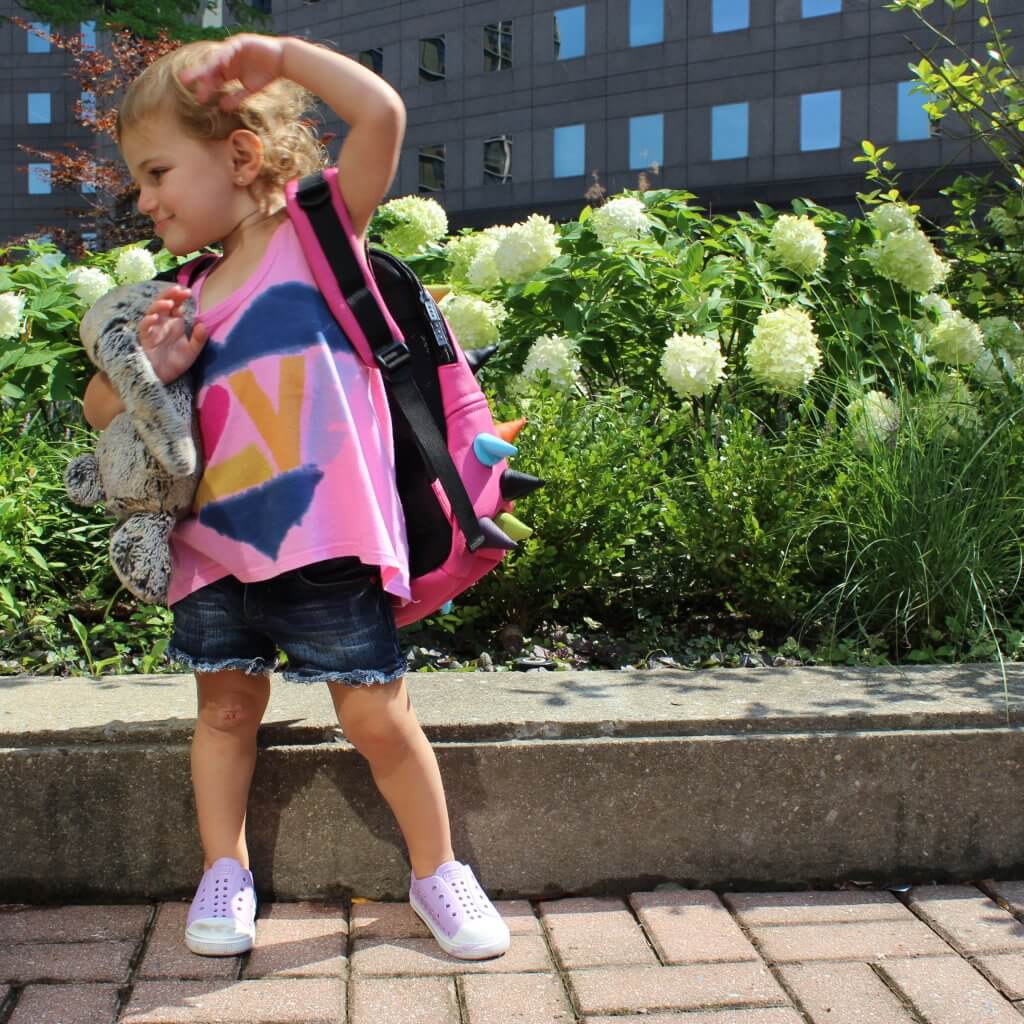Tips for Back to School Success

For children, one annual milestone that punctuates their life, (and your own), is going back to school. Thoughts of new teachers, making different friends or reconnecting with old ones, homework, exams, and many other concerns can give your child a bout of anxiety leading up to the big day.
As parents, we feel a little anxious for our little ones as well, knowing the feelings all too well. We want them to enjoy school, make new friends, get good grades, and develop the social skills necessary for the rest of their lives. Still, it can be difficult to convince some kids to look on the more optimistic side of things, and this can be especially true for very young children who have less experience with school.
In addition to the nervousness of not knowing what to expect, small children can also experience some separation anxiety that adds to their trepidation. After prolonged periods of being home with mom and dad, the idea of being on their own for the entire day can be a hard pill to swallow. The good news is that by following some simple steps you can help calm their nerves and set them up for success on their first day back.
First Things First
There are a number of things that you can do leading up to the big that will pay off for the entire year. Start by making sure that you have established a good bedtime routine prior to the start of school.

By making sure your child is well rested you not only increase their cognitive abilities, but you can also improve their ability to handle stress. You also want to get them into a good eating routine. Often times when school is out, breakfast, lunch, dinner, and snack times can vary depending on the agenda for the day. By making sure that your child has nutritious meals at regular intervals you will ensure that they are properly energized and ready for the meal-time structure associated with school life.
Get them into the habit of eating a balanced breakfast to start their day off right and a healthy lunch that prevents sugar crashes or being drowsy from overly processed foods. As the school year progresses, their bodies will adjust to these meal times.
Share Feelings
This is especially important for young children that may have difficulty putting their fears and concerns into words. Encourage your child to share how they feel about their big day and be empathetic towards their worries. Because children have imaginative minds, you should expect some degree of irrational fear of things that they are not familiar with.
Something as benign as riding the bus could cause a great deal of anxiety in a child. Give them your undivided attention in a quiet and private setting and let them put their feelings into words and explain how it’s natural for them to feel that way. You can assure them that many kids probably feel the same way as they do, and that it’s okay to feel nervous.
After school, especially in the first few weeks, talk with them about the fears or concerns that they’ve previously expressed and see how they are developing as they become more experienced with school. It’s not uncommon for new or different emotions to crop up, and by giving them a supportive ear to share them with, you can keep them from bottling their emotions up.
Look on the Bright Side of Things
You can help redirect your child’s attention away from their worries and encourage them to be more optimistic. This goes beyond simply reassuring them that “everything will be fine.” Have them come up with a few things that they are looking forward to in their school day and capitalize on them.
Chances are, your child can find some positive aspects for almost anything, even going to school. One thing that has worked well for our family is teaching our boys to break their school days down into sections.
This helps them from feeling overwhelmed by the length of the day. With things like snack time, lunch, PE, or crafts, there are plenty of opportunities for your child to segment their day in mentally manageable chunks. By keeping positive, your child is less likely to enter into a circular trap of worrying about things outside of their control.
Make a Plan
It’s almost unavoidable that your child is going to have at least a couple things that make them anxious about school. The problem with these concerns is that they distract your child from learning, and prevent them from actually enjoying school. Instead of being crippled by fear, make a plan with your child to help them get on the offensive against these worries. Is he or she worried about being alone?
Coordinate with the parents of a friend of your kid to have them meet outside of the school and walk in together. Maybe your child is afraid that they won’t know where all of their classes are. You can take advantage of the open house night and walk with your child to all of the places they need to go to. When my oldest son started junior high, his classes were spread out over 4 different buildings.
We went to the school the week before the first day and walked, in order of class, to each spot and timed the trips. That way, on the first day of school he not only knew where to head to and when, but also how long he had to get there for each period. Another common fear can be homework. This is a great opportunity to introduce your child to organization skills. When they feel organized, they are more likely to cope with the stress of meeting multiple expectations more easily. Things like day planners, labeled folders or dividers, and journals can be helpful in getting and keeping organized.
Set a Good Example
As parents, our children going back to school can be just as nerve-wracking. We not only feel anxious for our kids, hoping that they do well and adjust properly, but also the change in our own day-to-day schedule. Our children often pick up our own emotions and reflect them in their own behavior. By keeping calm and remaining positive, your child will feel more confident about their first days back. All you need to do is apply the same prep work to your own day as you do theirs and you can help combat any feelings of being overwhelmed or unprepared.
Don’t wait for the first day of school to get into the “back to school” routines, but rather take some trial runs the week or two leading up to it. Start with the appropriate bedtimes and meals, and you can even take a couple practice runs at getting the kids out the door with everything that they need for the day. If you drive your child to school, practice the best routes to go and know how long it can take. If your area is anything like ours, be sure to add in some buffer time to allow for the added swell of traffic and buses when school starts for real. Seeing you prepare for the start of the school year will give your child comfort that things are under control.
Get Supplies Together
I remember a year a while back that we left getting the necessary school supplies for the boys until the last minute. The aisles were picked over, nothing was where it was supposed to be, and the neighborly competition rivaled a Black Friday sale madness.

It didn’t need to be like that though, and we should have taken care of it all when we held the initiative better. Shopping for school supplies doesn’t have to be a drag though. Instead, plan a fun day with your child to go school shopping. You can make an entire day of it with lunch or dinner as well. That will help give it an air of excitement and fun rather than stress and anxiety.
Get the Teacher Involved
Surprisingly, when it comes to helping kids deal with the first day jitters, few parents are keen to get the teachers involved out of fear of coming off as being “that mom”. Maybe your child is afraid that they will gave to speak in front of the class, or maybe they’re afraid they won’t be able to see or hear the teacher.
The truth of the matter is that most teachers love to work with parents on optimizing their student’s performance and it goes beyond just getting good grades. If your child has a concern or fear that the teacher can help, by all means, reach out to them about it and you may be surprised at their level of familiarity with the fear and what good ideas they may have to help.
Plan Time to Unwind
Kids need a chance to decompress after school. This can be especially important the first few weeks back. Let the homework and chores wait a bit when they get home from school. Instead, free up some time for them to do something they enjoy, and if your kids are younger, make yourself available as well since being with you has probably been on their mind and heart all day. Let them go over their day with you without prying them for information on specifics. After a while, they’ll be more receptive to getting that homework done and preparing for the next day.
Be Ready for Resistance
Most children have a pretty standard playbook when it comes to doing things that they don’t want to. Baths, brushing teeth, bedtime, eating their vegetables, and the list goes on. As a parent, don’t feel that you have to indulge every little resistance or whine about school. Remember, going to school is also about discipline in doing things that we may not always want to do.
Yes, your child is probably going to complain or come up with a lot of reasons why they should not, or cannot go. Simply remind them that everything is going to be fine and that their feelings are normal. It may sound harsh, but the sooner that they realize that this is something they are going to have to confront, like it or not, the sooner they will be able to work on coping mechanisms.
Teach How to Make Friends
One of the initial fears your child may have could be their ability to make new friends. Since school, like it or not, can be a lot about social groups, don’t brush this fear off lightly. Instead, teach your child how to make new friends. This involves things such as introducing themselves, looking others in the eye, searching out common interests, and the ability to feel empathy.
When your child is comfortable in their social skills they will have more confidence in meeting new people. Since many of the kids in your child’s class are likely feeling anxious as well, by teaching him or her how to strike up friendly conversations other children will be drawn to them for their confidence.
Have Patience
The transition of either going back to school, or going for the first time can take time. Don’t rush the process or get discouraged with the speed of progress. Sooner or later routine and familiarity will set in and your family will find a rhythm that works for everyone.

You may find that there are better ways to do certain things as you go along, so remember that change can be more than just okay, it can be good. Talk to your child about how they are progressing both academically and emotionally, and keep the conversation going even as life falls into routine. Things like anxiety aren’t cured or solved overnight and it’s common for new issues to crop up as the year goes on.






